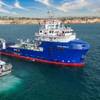Carbon Capture and Storage Under Seabed
Carbon capture and storage under the seabed is recognized as one tool in climate change mitigation. An International Maritime Organization (IMO) treaty, the London Protocol, provides the basis in international environmental law to allow CO2 storage.
This week, a proposal to agree the early application of an amendment to allow sub-seabed geological formations for sequestration projects to be shared across national boundaries will be put before Parties to the London Protocol (LP) and its forerunner, the London Convention (LC).
It would remove a barrier for countries which wish to make use of carbon capture and storage - but which do not have ready access to offshore storage sites within their national boundaries. Parties to the LC/LP treaties are at IMO Headquarters in London for their annual meeting (7-11 October).
The meeting will be asked to consider adopting a resolution to allow early application of a 2009 amendment which aims to permit CO2 streams to be exported for CCS purposes (provided that the protection standards of all other LP requirements have been met). The amendment is not yet in force.
If the resolution is adopted this week, it would allow provisional application and therefore the possibility of export of CO2 for sub-sea storage between Parties who deposit a declaration – ahead of the formal entry into force of the amendment.
The LC/LP meeting will also be urging States which have not done so to accept the 2013 amendment to the London Protocol which provides for the regulation of marine geoengineering activities. Marine geoengineering practices have been put forward as potential tools for countering climate change.
The London Protocol prohibits the dumping of wastes and other matter at sea except for those on a short list, for which permits must be sought. Currently all marine geoengineering activities are prohibited with the exception of ocean fertilization and that is limited to 'legitimate scientific research'. A high level review of marine geoengineering techniques was published earlier this year and the report will be presented to the meeting.
Among other items on the agenda this week, the meeting will look at how the London Convention and Protocol can continue to support the IMO Action Plan to Address Marine Plastic Litter from Ships, particularly as it relates to plastic litter that may end up in waste materials being assessed for dumping at sea.
The meeting is also expected to approve Revised Specific Guidelines for assessment of platforms or other man-made structures at sea, including updates to ensure the guidelines relating to recycling are compatible with the IMO requirements set out in the Hong Kong International Convention for the Safe and Environmentally Sound Recycling of Ships. Progress in addressing the disposal of fiber-reinforced plastic (FRP) vessels will also be reviewed.
The 41st Consultative Meeting of Contracting Parties to the London Convention and the 14th Meeting of Contracting Parties to the London Protocol was opened by IMO Director Hiroyuki Yamada on behalf of Secretary-General Kitack Lim. The chair is Mrs. Azara Prempeh (Ghana).
















